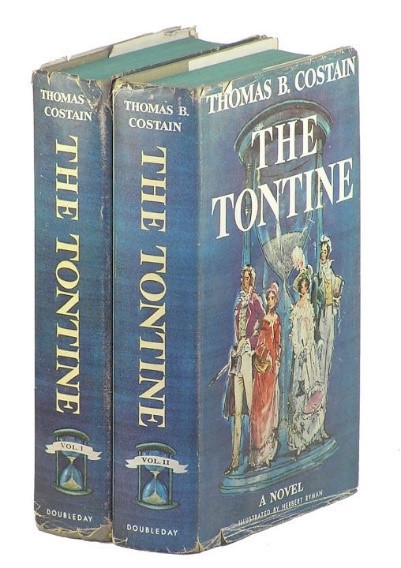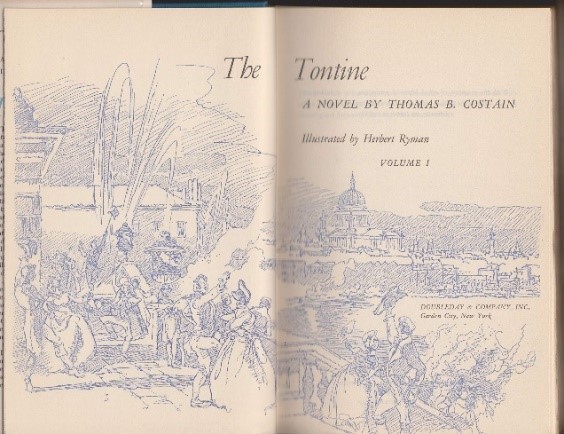This year I am reading 10 excellent twentieth-century books which have not been made into films or television programmes. This month’s book needs to have been published between 1950 and 1959. I chose ‘The Tontine’ by Thomas Costain.
Available in Auckland Libraries,
Look for it at Abe Books (second hand books online),
Also look in second hand bookshops and op shops.
When I searched for books published in the 1950s I was interested to see how the writing was starting to change. The decade starts off as a continuation of the previous fifty years; mainly stories about the middle classes overcoming difficulties and achieving great things. WW2 stories were still figuring prominently in the early fifties, so war books are common. Books like Operation Heartbreak by Duff Cooper (1950), and The Cruel Sea by Nicholas Monserrat (1951) were very popular and still make good reading today, but both these two books have been made into films.
Looking at books published in the mid-fifties, I noticed a lot of wonderful, long, epic stories like The Man on the Donkey, Lord of the Rings, The Tontine, The Winthrop Woman, Below the Salt, All the Day Long, Dr Zhivago..
Crime fiction was growing, and the best of crime fiction novels are often made into television series. Historical novels were very fashionable too.
By the end of the decade there was also a new genre of books – stories of working-class angst written by working-class authors. Books like A Kind of Loving, and Saturday Night and Sunday Morning. This new genre was sometimes referred to as Kitchen Sink Drama. No longer the romanticised heroics of the middle classes, conquering circumstances and winning all battles, but more realistically, people in everyday situations, facing quotidian problems and working their way through them, often in a messy way, and not always ending happily ever after.
So let me tell you about this month’s book – I went for a mid-decade book; an historical novel.
Have you ever heard of a tontine? It’s a sort of a cross between a bet and an insurance policy. In simple terms, a group of people put an agreed amount of money into a fund which gives them an annual pay-out. Then as time passes and people in the group grow old and start to die, the annual pay-out, shared between fewer people, increases for the ones still alive. So the longer you live, the larger your pay-out becomes.

In 1955, Thomas Costain, a Canadian writer and novelist, wrote a best-selling, historical novel about a tontine group. The story starts on the day of the Battle of Waterloo in June 1815. Mr Samuel Carboy, a great fan of the Duke of Wellington, buys shares in a falling market when there is a rumour that the Duke of Wellington has lost the battle against Napoleon at Waterloo. Of course, Wellington won the Battle of Waterloo, and Carboy becomes a very rich man overnight. He then buys out his business partner, Mr Grace, who doesn’t want to sell at all. And this is the start of problems between the families.
Carboy hears that Grace has bought into a tontine for his son, so Carboy buys into the tontine for his son and his daughter, and we follow the lives of the group over the next eighty years, with all the ups and downs, falling out and disagreements, loves and dislikes, secrets and deceits. We get to know the characters very well, and we start to care very much for them and for what happens to them and how they behave.

It’s a long book, (about 900 pages), but I read it fast because it’s a real page-turner – the sort of book you look forward to picking up. The book you carry back and forth with you, loving every page, and totally engrossed in every character. It’s an easy read, fast moving, cleverly written, and satisfying.
The book is available from the library, but if you decide to buy yourself a second-hand copy, make sure you have the full book, because it was also published in two volumes, as well as a single volume.
Next month I’ll review a book that was written in the 1960s and never made into a film or television programme.
Write to me with suggestions and ideas for titles and to talk about books. Write to stephanie at homeschoolfamilylife dot com.
